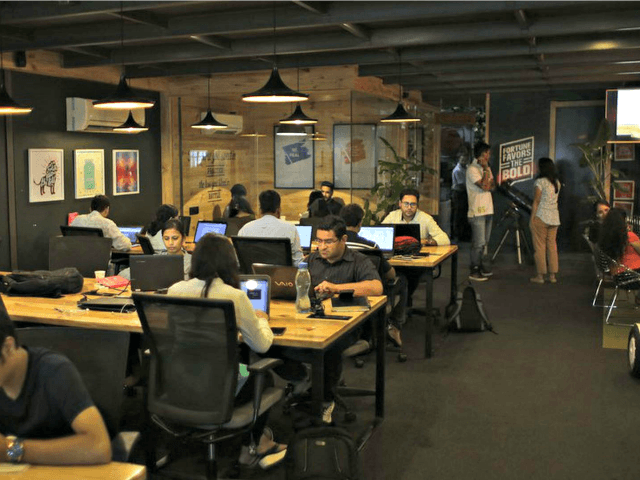Facebook has agreed to pay a tiny fine to close a federal investigation into alleged organized, persistent, and consistent discrimination against American graduates.
“Token fine, tip of the iceberg,” responded Jay Palmer, a former tech professional who now helps American and foreign white-collar workers file discrimination lawsuits.
“It’s not even a slap on the wrist” for Facebook, said Kevin Lynn, founder of U.S. Tech Workers. “What the Department of Justice has said, whether they intended to say this or not, is that [anti-American] country of origin discrimination is fine …[because] if you get caught, the penalties assessed are de minimus,” he added.
“Everyone involved … knows that many, probably most employers, game the system to exclude qualified US workers from ever getting a shot at the open position,” tweeted Ron Hira, a professor at Howard University. The small fine and legal settlements do “nothing to fix the widespread scamming of the high-skilled immigration process,” he said.
The alleged discrimination was conducted while Facebook executives were hiring foreign visa workers for 2,600 permanent jobs that would provide them with green cards. If the Americans had won the jobs, many of Facebook’s foreign visa workers would have been sent back to their home countries.
A statement from the Department of Justice said:
The lawsuit alleged that, in contrast to its standard recruitment practices, Facebook used recruiting methods designed to deter U.S. workers from applying to certain positions, such as requiring applications to be submitted by mail only; refused to consider U.S. workers who applied to the positions; and hired only temporary visa holders.
The agency statement described the minor penalties to be paid by Facebook:
Facebook will pay a civil penalty of $4.75 million to the United States, pay up to $9.5 million to eligible victims of Facebook’s alleged discrimination, and train its employees on the anti-discrimination requirements of the [immigration law]. In addition, Facebook will be required to conduct more expansive advertising and recruitment for its job opportunities for all [visa worker] positions, accept electronic resumes or applications from all U.S. workers who apply, and take other steps to ensure that its recruitment for [visa worker] positions closely matches its standard recruitment practices.
The fine is a very small slice of the company’s value, and the lawsuit covered only cases from January 2018 to February 2019 — which is a very small share of jobs held by foreign workers at Facebook.
The penalty is one-tenth of the fine imposed on auto-developer Tesla for allowing racial discrimination against one of its employees.
And the federal agencies will not expand the investigation: “Other than the provisions included in this Agreement, IER shall not seek on behalf of the United States or any individuals any additional funds, injunctive, or other relief from Facebook based on the underlying allegations in the complaint.”
Facebook did not even have to admit legal wrongdoing. “This Agreement does not constitute and shall not be construed as an admission by Facebook of any act in violation of 8 U.S.C. § 1324b or guilt or liability for any violation,” the settlement said.
The company will “continue our focus on hiring the best builders from both the US and around the world, and supporting our internal community of highly skilled visa holders who are seeking permanent residence,” a Facebook flack told media outlets.
The lawsuit was filed by President Donald Trump’s deputies amid the public pressure to live up to his pro-American campaign rhetoric.
Fortune 500 companies — and their many, many subcontractors — now employ more than 1 million imported contract workers in salaried jobs and in a pyramid of subcontractor jobs throughout the United States.
“This isn’t a few workers here or there,” Hira tweeted. “The scale and scope of harm to US workers is massive.”
“What we saw with Facebook is just the tip of the iceberg,” said Mark Krikorian, director of the Center for Immigration Studies. “There is a broader push to foreignize all higher-skill jobs, so that companies can hire any foreigner they want, at any wage they want,” he said.
The discrimination is made possible by the federal government’s vast network of visa worker programs, including the H-1B, L-1, B-1/B-2, and Optional Practical Training programs. Those visa-worker programs allow U.S. companies and their subcontractors to hire foreign graduates with dangled promises of very valuable green cards.
These foreign contract workers are not immigrants. But the dangled cards are a huge incentive for them because they want to become immigrants, and to bring their families — and all of their future children — out of their home countries.
The executives are very eager to pay their workers with green cards, which are provided by government agencies. This outside payment allows the executives to cut payroll costs and inflate their Wall Street values by $25 billion for every $1 billion not paid to American graduates.
The resulting “green card workforce” is a labor force of indentured workers that is competing for jobs against the free-market population of American graduates. That must be an unfair fight because the Americans must be paid in dollars that would otherwise inflate the companies’ stock values, while the green-card workers are being paid in cheap legal documents provided by the federal government.
Many of those foreign workers are erroneously touted as “high-skilled.” But the vast majority are only mid-skilled workers from lower-grade colleges hired by software-sweatshops for routine software upkeep jobs in place of skilled, free-speaking American graduates. Very few of these imported workers hold O-1 “genius visas.”

Foreign-born-workers are a “green card workforce” and labor force of indentured workers competing for jobs against the free-market population of American graduates. (AFP)
“My experience with the people from [India] is that they have no basic [information technology] knowledge,” said Mary from central New Jersey, an immigrant software expert. “They will say they have all this experience [to get hired] and then try to learn on the job. If you ask them a question, they can’t answer you. So what is happening is that we’re training them … [even though] we have our jobs — and their jobs — to do.”
The structural discrimination against Americans occurs in many professional careers, not just in software.
For example, the Department of Justice launched its case when Facebook tried to discriminate against Americans seeking an arts director job at the huge company. Similarly, many Americans who want to work in banks, or as scientists, doctors or nurses, or as teachers and academics, lose their careers and wealth to the imported visa workers from China and different regions of India.
The discrimination is multi-level, and includes much ethnic or regional favoritism by imported Indian and Chinese hiring managers. For example, immigrant managers can hire many co-nationals once they get post-graduate degrees from U.S. universities, regardless of fraud or inferior academic records.
Similarly, the pipeline of foreign workers into U.S. companies encourages taxpayer-funded U.S. universities to help train and win jobs for fee-paying foreign graduates, rather to promising young people in their home state.
Moreover, foreign-born managers in Fortune 500 companies can fire Americans so they can privately sell the jobs to co-ethnics via transactions in their home country’s economy. Indian hiring managers will sell jobs to Indians for $5,000 to $10,000, one Indian H-1B worker told Breitbart News. Honest Indian managers cannot stop the kickbacks, he said, because “you can’t survive — you will become a bottleneck in the chain. … [Senior managers] will fire you,” he said.
“Once you’ve created an Asian or an Indian [workplace] culture, American college students no longer have a chance of getting jobs in these companies,” said Palmer.
The discrimination has a larger impact on black Americans and on women, many of who are ostracized in workplaces dominated by Indian and Chinese managers and workers. “They’re very clannish. … They will push Americans out and make a group of their own,” Mary said. “When they’re talking in their Indian language, I have to ask them, ‘Can you speak English?’” she said. “I’m an outsider to them,” she added.
The discrimination has compressed salaries for many American graduates, partly because rejected Americans flood back into other careers. This shift spikes the wage-cutting competition for the non-technical jobs sought by many other American graduates.
Dice.com collects data on technology workers’ salaries. In 2019, the site showed that U.S. tech workers’ wages had dropped in value from 2009 to 2018 because inflation had exceeded the wage gains. The salaries had risen from $78,845 in 2009 to $93,244 in 2018, slightly below the inflation rate.
The discrimination is economically damaging because it gives the top executives far more control over their workforces. For example, after many companies were caught operating an anti-employee cartel hiring system in the early 2000s, the executives decided to hire more of the compliant and no-rights foreign workers. This hiring shift was welcomed by executives because the foreign workers will not leave the company until they get their green cards after several years.
“This is calculated,” said Palmer, who works with possible plaintiffs for the Consumer Awareness Group. “This is all planned in boardrooms, authored by managers … This is designed to break the back of the professional class.”
“They don’t have power over American professionals — but they do have power over the H-1Bs,” Palmer said.
“It is class warfare,” said Lynn: “The goal is to displace Americans that corporate executives view as expensive and undeserving, and easily replaceable with foreign workers that are more pliant and less expensive.”
That C-suite warfare against graduates is damaging the United States, Lynn said, because “American professionals are the ones that bring the innovation, and they’re being pushed out of the workplace.”
This subservient foreign workforce reduces professional-style competition within each company, and technology competition within each industry sector. Armondo from Texas told Breitbart that Indian-managed workplaces destroy U.S. professionalism:
That’s the way they operate — they will go over your head and start sabotaging you. They are trying to do everything they can to keep their job. … They are under a lot of pressure and are limited on what jobs they can get because of the visa. … The Indian managers know they have inexperienced people who can’t do crap, but they don’t fire them … An Indian manager does not fire them even because he knows this guy has a family and is married and they are not going to throw an Indian on the street.
“I was brought up that if you find an [technical problem] issue, raise it immediately,” an American professional told Breitbart. However, the rules are different in an office run by Indian managers, he said:
When you find a bug, don’t announce it [to your department colleagues]. Announce it to your [Indian] boss [because] they want to make sure it’s not their problem and not their bug. Don’t go through the normal process.
“I saw this over and over at Intel,” he said. “God help you if you make the mistake of questioning somebody[‘s judgment in an Indian-run office] … everybody else rallies around [the person] and [claims to] fix the issue. So it’s like, it’s effing unbelievable. It’s the most frustrating thing.”
In turn, the reduced competition reduces innovation in many sectors where China’s government-backed companies — and their U.S.-trained workers — are making progress, for example, in 5G wireless gear, in artificial intelligence, and in quantum computing.
The reduced competition also ensures more consolidation among politically powerful companies. That consolidation can drive up prices, profits and stock values — so diverting potential wealth from other sectors of the economy or from heartland regions to the coastal states.
This political consolidation also reduces competition as upstart innovative companies can be quietly forced to sell out to the major companies.
It also gives the companies more political power in D.C. to pass laws that will enable more discrimination.
The foreign workers also create their own political lobbies — usually with cooperation from diplomats from their home country — to grow their numbers at the expense of American graduates.
The existence of the visa workers also gives federal and state government — and company CEOs — an excuse to avoid recognizing painful flaws in the education and training sectors.
Similarly, the flood of imported workers allows investors, CEOs, and legislators to ignore productivity problems in the healthcare sector and in the science sector. These lobbying groups have repeatedly stymied popular reforms of the visa worker laws, and a now pushing to expand the outsourcing process in the pending reconciliation bill.
The Fortune 500’s hiring strategy increasingly leaves the United States dependent on imported workers for core tasks, said Krikorian, adding:
It’s even worse than dependence on foreign sources of energy because we can always dig another hole and find more energy … Once [critical careers are built on foreign labor], you almost have to start from scratch to develop a domestic workforce in these technical and scientific fields … [and] what large scale immigration does is take away the incentive for business and educators and society in general to do what’s necessary to develop the staff for core jobs like this.
The economic damage will be difficult to stop, say advocates.
Multiple private lawsuits are raising the cost of discriminating against American graduates.
President Donald Trump promoted deep reforms of the green card workforce — but only in the last year of his presidency. Most — but not all — of those changes were quickly dropped by President Joe Biden’s deputies.
“It requires both some changes to the law that Congress has to do, as well as serious enforcement by the executive agencies, which we almost never see,” said Krikorian. “Do our leadership classes actually care about protecting American jobs, or is that something that, at most, they pay lip service to?”
But the media buries the problem because “most reporters do not understand that the issue is between the executives and the professionals,” said Palmer.
The fight is not primarily about immigration, he said. “This is a labor issue — this is about basically locking out college graduates, locking out the middle class.”


COMMENTS
Please let us know if you're having issues with commenting.